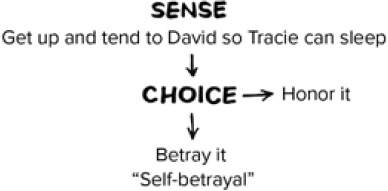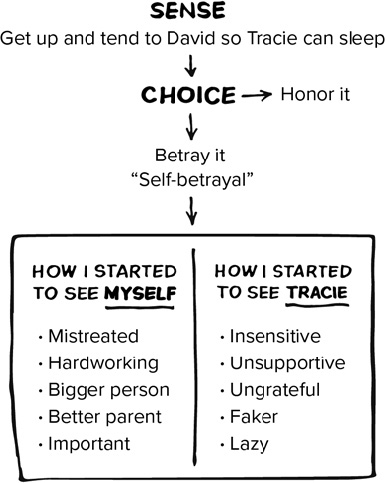8 • A TWISTED NEED
“Sometimes it’s easiest to see how self-betrayal leads to self-deception by drawing it out,” Theo said. He turned to Kate. “I believe a diagram is in order, don’t you?” She gave a jaunty salute with the marker.
“I’ll use my story for now,” Theo said, “but be thinking about how the principles apply to your own circumstances, especially in or between your teams. Self-betrayal and self-deception show up here at Zagrum, just like everywhere else.”
Tom and Ana nodded.
“So that night, I had a sense: get up and take care of our son before Tracie wakes up. The moment I felt that feeling, I had a straightforward choice. I could honor my sense or betray it.”
Kate wrote on the board:

Figure 3: The path to self-betrayal
“You already know how things unfolded. I hesitated to do what I originally felt to do, and that choice had an impact. How did it influence the way I saw Tracie?”
“You said you had a big meeting, right?” Ana said. “So maybe you saw her as insensitive or unsupportive.”
Theo nodded. “What else?”
“Not appreciative of the work you were doing,” Tom said.
Kate added “ungrateful” to the list.
“You even thought she might be pretending to be asleep!” Kate noted.
“That’s right,” said Theo. “Throw ‘faker’ up there for good measure. And if she can hear the baby but isn’t getting up, what does that make her?”
“Lazy,” Tom said.
“Right,” Theo said. “Okay, so how do you imagine I was seeing myself in all this?”
“Hmm,” Tom said, leaning back. “Taken advantage of, for sure. And hardworking.”
“Maybe a bit of a martyr?” Ana offered hesitantly.
“No question,” said Theo. “I thought I was getting a bad deal. I saw myself as being the bigger person, maybe even the better parent! And I definitely felt some self-righteousness, thinking about all the important things I was doing for our family.”
The list Kate had written looked like this:

Figure 4: Self-betrayal example
“Kate,” Theo asked, looking at the diagram, “does this sound like my wife to you?”
“Not in the slightest,” Kate said. “Tracie’s one of the greatest people I know.”
“This distorted way of seeing myself and others, this is self-deception,” Theo said. “I turned inward and lost touch with reality. My wife, who is my best friend and a remarkable woman, became a warped caricature of exaggerated flaws. And I became the tragically noble martyr, burdened by a few minutes of childcare—for my own child!”
“But you did get up,” Tom repeated, exasperated. “Doesn’t that count for something?”
“Of course,” Theo said. “The baby had to be tended to. But ultimately, how we see others matters as much as what we do. Even though I eventually got up, my self-betrayal opened the door for all the negative and distorted thoughts and feelings of self-deception as much as if I hadn’t got out of bed at all.”
“And Theo is not alone here,” Kate added. “These kinds of distortions, like inflating the shortcomings of others and magnifying our own virtues, follow self-betrayal almost every time.”
“I think I’ve seen this playing out,” Ana said slowly. “But why all the mental gymnastics?”
“You know,” Kate said, “I was reading the other day that biologists assume a creature’s behavior or anatomy evolved for some useful purpose, even if it doesn’t seem to make any sense now. I think that applies here. How might Theo’s warped perception be useful to him?”
Ana looked at the diagram, and Tom shrugged.
“I’ll offer another hint,” Theo said. “All my negative energy and blame and self-pity came after I betrayed my sense to take care of my son.”
Ana’s eyes widened. “Your perceptions make it seem okay that you stayed in bed.”
“That’s exactly right,” Theo said. “My distorted views made it seem like Tracie was the one at fault. And, in a twisted way, I wasn’t just looking for reasons it was okay if I didn’t get up; I was even looking for reasons that I shouldn’t get up.
“But notice this: When I first woke up and heard David crying, life was straightforward. I needed to help my son and get back to sleep. But the moment I betrayed that sense, I created a new need, one that was almost all-consuming. I needed to be justified.
“And just like that”—Theo snapped his fingers—“I am deceived. Self-deceived. I began to see myself and Tracie in ways that gave me the excuse I needed, ways that justified my self-betrayal.
“I even believed that this false, distorted way I saw myself and Tracie was the truth. I thought I was the better partner and parent in the very moment I was grudgingly looking after my son and resenting my wife. I was swallowing the very lie that I had created!”
Underneath the definition of self-betrayal, Kate wrote, “When we betray ourselves, we seek justification and turn inward.”
“Self-betrayal isn’t just making a mistake,” Kate said. “It’s ignoring an internal call to respond to the humanity of others, then hunkering down in staunch denial of our choice. It sets us on a futile quest for justification. We trade reality for a self-serving fantasy that only diminishes our capacity to connect with others and solve problems.”